Artists' Excursion Over
the Baltimore & Ohio Rail Road
by Porte Crayon (David
Hunter Strother)
Harper's New Monthly Magazine—June, 1859
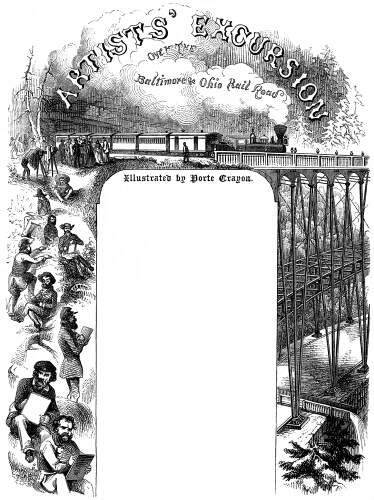 "Many
a noble heart,
"Many
a noble heart,
Many a regal head,
Labors for our native land
Harder than the horniest hand
For its daily bread;
Painter, poet, statesman, sage,
Toll for human kind,
Unrewarded but of Heaven
And the inner mind."—Anon.
THE ages of gold, of silver, of brass, and iron, as described
by the poets, are past. The present is the age of steam. By steam
the commerce of the world is carried on. By steam we travel over
sea and land. Steam has turned manufacturer, farmer, cook (although
it must be acknowledged it makes but a sorry business of this
last). Latterly, steam and the fine arts have scraped acquaintance.
The real and the ideal have smoked pipes together. The iron horse
and Pegasus have trotted side by side in double harness, puffing
in unison, like a well-trained pair. What will be the result of
this conjunction Heaven knows. We believe that it marks the commencement
of a new era in human progress; and it is meet, therefore, that
some record of the event should be given to the world.
On such an occasion, perhaps, the lions themselves should have
been the carvers; but it has pleased them to delegate the task.
Friends and fellow-excursionists! with the aid of your faithful
memories to supply its deficiencies, with your kindly good-humor
to interpret its freedom, with the light of your joy-giving spirits
to illuminate its dullness, we may indulge the hope that this
record will not be deemed altogether unworthy of the great event
it is designed to perpetuate.
Before entering upon our narrative we will indulge in a few
remarks upon the birth and ancestry of the principal actor in
our drama—Steam; and yet, in so doing, we are sadly puzzled
to know where to begin, or where to leave off. To what master-mind
does the world owe the great idea? Is it to Fulton? Both Fitch
and Ramsey used it before his day, and they got it from Oliver
Evans, and he doubtless from Watt; and Watt, through Savary, Papin,
and others, was beholden to the Marquis of Worcester. And is it
not proven that the Marquis obtained the secret in France, from
poor Solomon De Caus? who was imprisoned for trying to force the
idea into Richelieu's head against the will of the imperious Cardinal.
Then Italy claims the 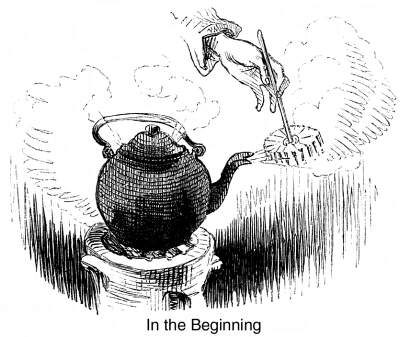 honor
by Giovanni Bianca, and Spain, as the invention of Blasco de Garay.
But Hero of Alexandria, one hundred and twenty years before the
Christian era, speaks of a machine moved by the vapor of water,
in his work entitled "Spiritalia seu Pneumatica." Was it by this power that the obelisks were brought from their
quarries, and the monstrous sphinxes trundled about? May we not
suppose that the Chinese and Hindoos understood the subject long
ages before the sculptors of sphinxes and obelisks were born?
and that the first conceit entered Adam's head perhaps as he watched
the boiling of his wife's teakettle; for, to quote from a French
writer, "C'est que nos progres sont lents, plein de tatonnements
et d'incertitudes; qu'ils s'enchainent les uns aux autres, de
maniere a rendre bien problematiques toutes les questions d'origine
et de decouverte. Si Yon voulait faire une histoire complete de
la machine', it vapeur il faudrait remonter au commencement du
monde."
honor
by Giovanni Bianca, and Spain, as the invention of Blasco de Garay.
But Hero of Alexandria, one hundred and twenty years before the
Christian era, speaks of a machine moved by the vapor of water,
in his work entitled "Spiritalia seu Pneumatica." Was it by this power that the obelisks were brought from their
quarries, and the monstrous sphinxes trundled about? May we not
suppose that the Chinese and Hindoos understood the subject long
ages before the sculptors of sphinxes and obelisks were born?
and that the first conceit entered Adam's head perhaps as he watched
the boiling of his wife's teakettle; for, to quote from a French
writer, "C'est que nos progres sont lents, plein de tatonnements
et d'incertitudes; qu'ils s'enchainent les uns aux autres, de
maniere a rendre bien problematiques toutes les questions d'origine
et de decouverte. Si Yon voulait faire une histoire complete de
la machine', it vapeur il faudrait remonter au commencement du
monde."
Butler tells us that
"All the inventions which the world contains
Were not by reason first found out, nor brains,
But fell to those alone who chanced to light
Upon them by mistake or oversight."
This may be true in regard to a host of discoveries, and we
have read a great many anecdotes to the purpose; pleasant, if
not true. But the giant of the nineteenth century is not the child
of chance. Though its origin is lost in the mists of antiquity
for twenty centuries at least, it has been the nursling of labor
and genius. In assisting its development and progress, how "many
a noble heart," how "many a regal head, " has perished
unrewarded and unknown! But while rival nations may boast of priority
in conception, of having furnished a vague thought or inconclusive
experiment, the great result is directly and undoubtedly due to
the practical pertinacity of the Anglo-Saxon.
Next arises the question between the Anglo-Saxon of the Old
and the Anglo-Saxon of the New World.
Since the day that France awarded to Franklin the medal with
the famous legend, "Eripuit coelo fulmen sceptrumque tyrannis,"
the New World has generally led the Old in the great utilitarian
enterprises that mark the civilization of the age, and men have
begun to suspect that the true bird of wisdom is not the owl but
the eagle. Although Europe justly claims precedence in speculative
science, how many a grand principle has there lain dormant, inoperative
for centuries—a theme for the discussions of impractical
savants, a bauble for the entertainment of the curious—which,
when transplanted to the soil of the Great Republic, has quickly
developed into gigantic life and activity!
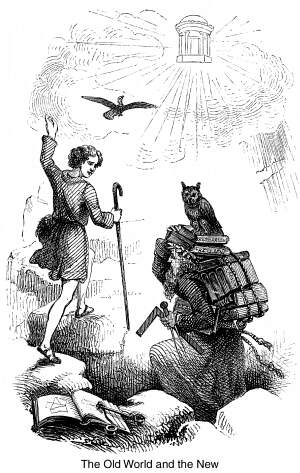 While to England
undoubtedly belongs the honor of having originated the railway,
yet the idea vegetated there for more than a century before it
fairly awoke to life and movement. And when at length the cautious
experiments, still unacknowledged and incomplete, made noise enough
to wake an echo in the West, the first response was the adoption
of the grandest and most audacious scheme for purposes of internal
commerce which has yet been conceived and executed, and in thirty
years thereafter our maps are streaked over with black lines representing
thirty thousand miles of railroad.
While to England
undoubtedly belongs the honor of having originated the railway,
yet the idea vegetated there for more than a century before it
fairly awoke to life and movement. And when at length the cautious
experiments, still unacknowledged and incomplete, made noise enough
to wake an echo in the West, the first response was the adoption
of the grandest and most audacious scheme for purposes of internal
commerce which has yet been conceived and executed, and in thirty
years thereafter our maps are streaked over with black lines representing
thirty thousand miles of railroad.
It was not until 1829 that the capability of the railway was
clearly and practically established by the introduction of steam
locomotives on the Liverpool and Manchester road, then in course
of construction. Fifty years before this event an ingenious American,
Oliver Evans, of Maryland, suggested the idea of railways for
purposes of general trade and travel, with steam-carriages as
the motive power. The Legislature of Pennsylvania treated his
application for a patent with contempt; and, wanting means himself,
his conceptions were not realized until half a century later.
To what extent his plans were matured and capable of being turned
to practical account may be inferred from the following prophecy,
extracted from a little volume published Anno Domini 1813:
"The time will come when people will
travel in stages moved by steam-engines from one city to another,
almost as fast as birds can fly, fifteen or twenty miles in an
hour.
"Passing through the air with such velocity, changing
the scenes in such rapid succession, will be the most exhilarating
exercise.
"A carriage will set out from Washington in the morning,
the passengers will breakfast at Baltimore, dine at Philadelphia,
and sup at New York the same day.
"To accomplish this, two sets of railways will be laid
(so nearly level as not in any place to deviate more than two
degrees from a horizontal line), made of wood or iron, or smooth
paths of broken stone or gravel with a rail to guide the carriages,
so that they may pass each other in different directions, and
travel by night as well as by day; and the passengers will sleep
in these stages as comfort. ably as they now do in steam stage
boats.
"Twenty miles per hour is about thirty-two feet per second,
and the resistance of the air will then be about one pound to
the square foot; but the body of the carriages will be shaped
like a swift swimming fish, to pass easily through the air. .
. .
"The United States will be the first nation to make this
discovery and to adopt the system, and her wealth and power will
rise to an unparalleled height."
In another paper, published in the Aurora of Philadelphia,
dated December 10, 1813, public attention is called to a project
for connecting that city with New York by railway, and, after
describing several plans for laying the proposed track, Mr. Evans
thus concludes: "I renew my proposition, viz.: as soon as
either of these plans shall be adopted, after having made the
necessary experiments to prove the principles, and having obtained
the necessary legislative protection and patronage, I am willing
to take of the stock five hundred dollars per mile, to the distance
of fifty or sixty miles, payable in steam-carriages or steam-engines,
invented by me for the purpose forty years ago, and will warrant
them to answer to the satisfaction of the stockholders, and even
to make the steam-stages run twelve or fifteen miles per hour,
or take back the engines at my own expense if required."
The confident zeal of the ingenious inventor seems to have
awakened no corresponding confidence in the public mind. When
we consider the character of the people whom he addressed, and
the stimulating necessity, in a country of vast extent and sparse
population, for extraordinary means of travel and transportation,
we can only account for the apathy with which his propositions
were received by supposing that the world was not then ready for
the subject. In those days were wars and rumors of wars, and,
amidst the thunders of battle and the downfall of kingdoms, "the
poor man's wisdom is despised, and his words are not heard."
Oliver Evans lived a generation too soon; and thus it was that
America lost the honor of originating, practically, the Railroad
system.
At length the temple of Janus was closed, and the time came for
the triumphs of peace.
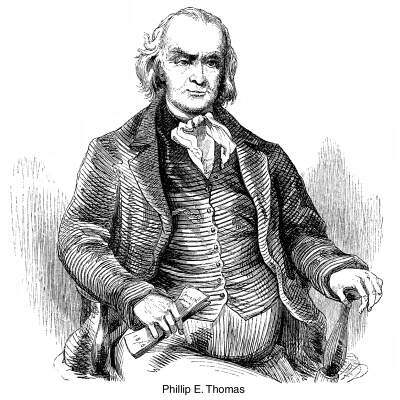 As the husbandman
burns the rubbish from his field, and plows deep into the earth
that, among the clods and ashes, good seed may be sown to yield
its fruit in due season; so had the fields of Christendom been
wasted with fire, and broken up with the hot plowshare of war,
that, from the clods and ashes of ignorance and superstition,
a better seed might spring and nobler fruits be gathered.
As the husbandman
burns the rubbish from his field, and plows deep into the earth
that, among the clods and ashes, good seed may be sown to yield
its fruit in due season; so had the fields of Christendom been
wasted with fire, and broken up with the hot plowshare of war,
that, from the clods and ashes of ignorance and superstition,
a better seed might spring and nobler fruits be gathered.
In the origination of such a work as the Baltimore and Ohio
Railroad, at a time when the system was still in its infancy,
we scarcely know which most to admire, the far-reaching sagacity
which conceived the idea, or the hardy and zealous faith in which
it was accepted. To Philip L. Thomas, Esq., a Quaker merchant
of Baltimore, is generally accorded the, honor of having been
the first to suggest and urge the undertaking, moved thereto by
some written advices from England. The city of Baltimore, at that
time worth but twenty-five millions, unhesitatingly embarked in
an enterprise to complete which has cost thirty-one millions.
We doubt whether there is on record a similar instance of commercial
pluck. Mr. Thomas still lives in the full enjoyment of the "mens
sana in corpore sano;" and, at the advanced age of eighty-four,
has the gratification, in his daily walks, of seeing around him
the magnificent results of his foresight. Verily, he that buildeth
is greater than he that destroyeth a city, and greater is his
reward. As the calm approval of the inner mind, the silent and
unsougnt homage of the thinking world, is nobler than the noise
of the fitful rabble that hails the last favorite of fortunate
war.
The work of construction was commenced on the Fourth of July,
1828, with appropriate pomp and ceremony. The venerable Charles
Carroll, of Carrollton, laid the first stone, and pronounced it,
next to his signing the Declaration of Independence, the most
important act of his life. During the progress of the work, from
year to year, old theories were exploded and new principles introduced,
increasing in boldness and originality as it advanced. "Its
annual reports went forth as text-books;" "its work-shops
were practical lecture-rooms;" and to have worthily graduated
in this school is an honorable passport to scientific service
in any part of the world. In its struggles with unparalleled difficulties—financial,
physical, legislative, and legal—the gallant little State
of Maryland found men equal to every emergency as it arose, and
the development of so much talent and high character in various
departments should not be esteemed the smallest benefit which
the country has derived from this great enterprise.
In the spring of 1858 a number of distinguished artists and
literati were invited to make a pleasure-excursion over the road
by a special train to start from Baltimore on the 1st of June.
The company's guests were to travel at their leisure, stopping
at all the prominent points of interest long enough to examine
the most notable productions of human science and labor; to enjoy
the magnificent natural scenery for which the line is so famous;
and, if so disposed, to exercise their talents after the manner
of Doctor Syntax—
To prose it here, to verse it there,
And picturesque it every where."
It was particularly appropriate that the pioneer of the American
railway system should also have been the first to inaugurate this
new and significant idea. For the first time in our history had
the great embodiment of utilitarianism extended the hand to the
votaries of the beautiful, claiming brotherhood and asking co-operation.
Our development, although without parallel in its rapidity, has
hitherto been confined too strictly to the hard, narrow path of
materialism. The elegant arts have existed among us rather as
potted exotics imported from abroad, baubles to amuse the idle,
luxuries to delight the rich, and, as such, awakening no real
sympathy in the hearts of the people. The artist walks among us
as a man apart, a solitary, a dreamer; misunderstood, unrecognized
in the great working hive of society. Bookman looks askance at
the ingenious handicraft: Hardfist despises the flaccid muscle
and velvet palm; timorous Respectability has a horror of superfluous
hair; venerable Conscientiousness is not sure but that the making
of graven images and likenesses of things on the earth is contrary
to Scripture.
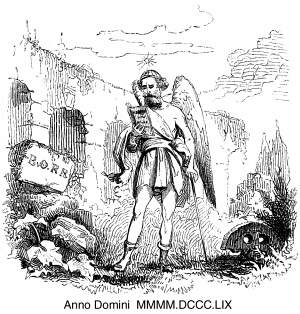 But it can
not be that the brightest, busiest, and freest people on earth—a
people that has builded this vast temple to civilization in the
Western wilderness—will ever rest until the work is completed
and crowned by the ennobling hand of Art. Brethren, the day is
not far off. Like the cock's shrill clarion, heralding the coming
dawn, hearken to the invocation of the Iron horse:
But it can
not be that the brightest, busiest, and freest people on earth—a
people that has builded this vast temple to civilization in the
Western wilderness—will ever rest until the work is completed
and crowned by the ennobling hand of Art. Brethren, the day is
not far off. Like the cock's shrill clarion, heralding the coming
dawn, hearken to the invocation of the Iron horse:
"Come, ye gifted of the land—worshipers at the shrine
of the beautiful—from your seclusion in the clouds—come
down, and see the mighty works your kindred race has wrought;
cease from sighing o'er the mouldy Past; turn away from heroes
that are strangers to your people, from gods that are not theirs;
waste not your inspirations upon idle or unworthy theme; but come,
with hands of skill and hearts of fire, to glorify a Present worthy
of your powers. Scorn not the proffered friendship, but let the
artist clasp hands with the artisan; let the Poet walk with the
People. Illustrate, adorn, exalt, embellish, that the nobler aspirations
of the human soul after truth, beauty, and immortality may be
realized!
"Write, paint, sketch, and chisel that when ten, and thrice
ten, hundred years are gone, and our fires shall be quenched,
our iron bodies heaps of rust, the noble archways that have borne
us over rivers and mountain gorges shall have crumbled into ruin,
the stranger (perhaps a winged tourist from some other sphere),
finding a mossy stone carved with the letters B. & 0. R. R.,
may know that they stand for 'Baltimore and Ohio Railroad,' the
grandest and most renowned work of its age!"
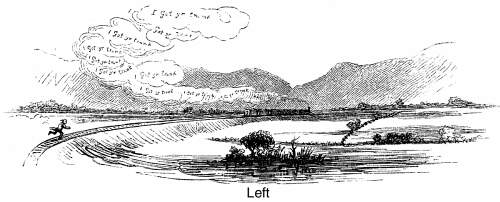 The engineer
turned the steam-cock, and the invocation comes to a sudden stop.
But the light-hearted craftsmen had heard the call, and were not
backward sending in their acceptances—right glad to lay down
pencil and pallet for a season to join a whole-souled frolic;
to turn from the mimic creations on their canvas to scenes of
real life and sunshine.
The engineer
turned the steam-cock, and the invocation comes to a sudden stop.
But the light-hearted craftsmen had heard the call, and were not
backward sending in their acceptances—right glad to lay down
pencil and pallet for a season to join a whole-souled frolic;
to turn from the mimic creations on their canvas to scenes of
real life and sunshine.
So, on the afternoon of the 31st of May, the guests began to
assemble at the indicated place of rendezvous, the "Gilmore
House," in Baltimore; and then and there commenced the thousand-and-one
delightful little incidents which will live in many memories as
perennial fountains of refreshment. There were meetings and greetings
of old friends, school-mates, fellow-wanderers in foreign lands,
who had not seen each other for years; there were presentations
and salutations between those who, seen for the first time in
the flesh, had long been united in spirit; the appreciative recognition
of names well known to fame; the curious and admiring scrutiny,
to note in what manner of casket the Master had chosen to bestow
those rare gifts of which the world had spoken so approvingly.
But some of our best friends are missing our choicest spirits.
Where is N.? Where is R.? Left behind—too late for the train.
Bah! what a flattening sensation it produces to see the cars moving
off just as we arrive, red and panting, at the depot! How is 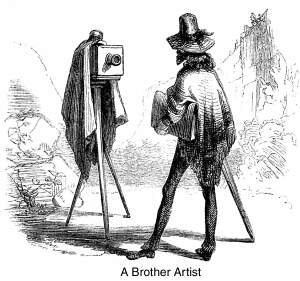 one overwhelmed with
self-abasement too deep for anger, the jest of grinning porters
and vulgar idlers; and, worse than all, to hear the mocking yell
of the fiendish locomotive in the rapidly lengthening distance!
But no regrets; our friends have sped a message that has put the
speed of the locomotive to scorn in its turn. They will join us
to-night. All's well!
one overwhelmed with
self-abasement too deep for anger, the jest of grinning porters
and vulgar idlers; and, worse than all, to hear the mocking yell
of the fiendish locomotive in the rapidly lengthening distance!
But no regrets; our friends have sped a message that has put the
speed of the locomotive to scorn in its turn. They will join us
to-night. All's well!
About eight o'clock in the evening the company sat down to
a dinner, especially prepared for the occasion. And such a dinner!
Ye gods! Talk of the suppers of Apicius, with their pencocks'
brains and other barbarous nonsense! We'll guarantee the luxurious
heathen never dreamed of such a feast as this. And if, as some
one observed, there was less wit current than might have been
expected from such a company on such an occasion, it may be fairly
inferred that the bountiful providence of our host of the "Gilmore"
met with an appreciation too deep for words. Besides, folks were
tired with the day's journey, and the transition from table to
bed was easy and natural.
Good-night! It still rains, but all the better. Things will
look fresher when it does clear up, and the waterfalls will be
in fine condition. The morning of the 1st of June dawned most
unpropitiously; the heavens were covered with damp, spongy clouds,
that squeezed out drenching showers whenever they happened to
jostle. But in spite of these unpromising appearances the excursionists
were at the Camden Street depot at the appointed hour. The missing
parties had arrived during the night, and, with the guests of
the previous evening, were "all agog to dash through thick
and thin."
But before we start we must describe the magnificent train
prepared for their accommodation. It was composed of six cars,
drawn by engine No. 232—a miracle of power, speed, and beauty,
and much such an animal as Job had in his eye when he described
Leviathan. The forward compartment of car No. 1 was fitted up
for the convenience of the photographers, and occupied by several
skillful and zealous amateurs of that wonderful and charming art.
Brother, give us your hand, though it be spotted with chemicals.
Is not the common love of the beautiful the true bond of union
between us? What matters it whether we see our divinity with eyes
of flesh or glass eyes?
Adjoining was the baggage and provision room, where heaps of
square willow baskets gave promise of good cheer. Next came the
dining-saloon, with a table running the whole length of the car;
then the parlor, furnished with springy sofas and a handsome piano-forte.
Following this were two cars with tables and desks for writing
and drawing, also containing comfortable sleeping apartments.
The last was the smoking-room, whose windows and rear platform
afforded the best opportunity for seeing the country.
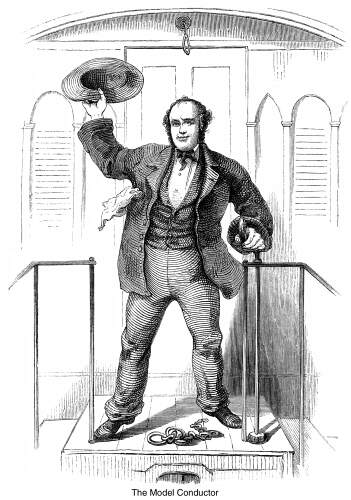 A talented
and accomplished gentleman, Mr. William Prescott Smith, in charge
of the aesthetic and social department of the expedition, had,
on the part of the Railroad Company, welcomed and introduced the
guests to these elegant and luxurious quarters. Billy Hughes,
the Company's faithful and reliable "Passenger car Inspector,"
had, with penknife and hammer, examined the train from end to
end, and given official notice that all was right. 232, impatient
of delay, was stewing and fretting in his iron harness, when the
voice of Captain Rawlings, the model conductor, sung out, sharp
and clear,
A talented
and accomplished gentleman, Mr. William Prescott Smith, in charge
of the aesthetic and social department of the expedition, had,
on the part of the Railroad Company, welcomed and introduced the
guests to these elegant and luxurious quarters. Billy Hughes,
the Company's faithful and reliable "Passenger car Inspector,"
had, with penknife and hammer, examined the train from end to
end, and given official notice that all was right. 232, impatient
of delay, was stewing and fretting in his iron harness, when the
voice of Captain Rawlings, the model conductor, sung out, sharp
and clear,
"All aboard!"
The locomotive gave a yell of delight. Ding-dong! ding-dong!
we are off. Oh for the pen of Saxe, that we might express the
joyousness of rapid railway motion!
At starting our party numbered about fifty souls, collected
from Boston, New York, Philadelphia, Baltimore, and Washington,
besides several individuals from the country. All branches of
the liberal arts were handsomely represented, and we will wager
that it has never fallen to the lot of any other locomotive to
draw so rich a freight of varied talent and accomplishment.
But the weather? Still clouds and rain. No matter; it will
not dampen such a company as ours. Already two accomplished performers
have boarded the piano, and are storming away at the overture
of "Massaniello," with such concomitants as would have
astounded the fiery soul of the great Auber himself. Con moto—thirty
miles an hour—presto prestissimo! steam-whistle—sostenuto
e fortissimo! wheels—tremando e rinforzando! escape-pipe—staccato
e sfogato! Allegro—"Come o'er the moonlit sea"—forty
voices. Hurrah for music, wine, and good-fellowship! What care
we for clouds or rain?
In the mean time the train was rushing over the iron path at
a round rate. At the Washington Junction the pretty landscape
was completely befogged The picturesque valley of the Patapsco
to Ellicott's shrouded in mist. As they progressed the external
world of gray shadows was left to take care of itself, and the
tourists were richly remunerated by the opportunity thus afforded
of developing their internal resources. There was music, vocal
and instrumental; there was wit, Champagne, and deviled crabs;
there was humor, broad and jovial; conversation genial and intelligent.
From the numerous earnest and animated groups one may catch an
occasional characteristic word or thought amidst the din.
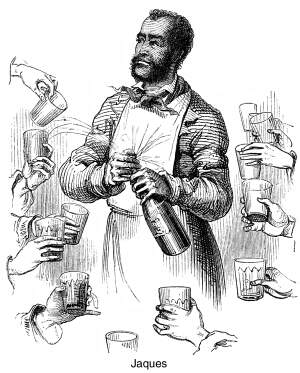 "Well,
old friend, how has the world gone with you since we last parted?
Do You remember the tour we made with D---- and M---- to Valombrosa
and Laverna? ……Those glorious evenings at our quarters
on the Lung Arno ...... And D---- is dead, poor fellow! There
perished a promising artist and a high-souled gentleman…..We
traveled together through Palestine and Egypt. I left him sketching
a Sphinx ...... Still in Rome, pursuing his art, poor, persevering
and enthusiastic…. And W----? Has a large family. I saw a
group of children by him in the last exhibition; well executed
and life-like...... he went to the East Indies...... the foliage
of Central America is rich beyond the power of a temperate imagination
to conceive...... doubtless, Greek art has fulfilled its mission
And Ruskin? Old gods overthrown, and new ones set up, which are,
worse…. it is singular how much attention a mere phrasemonger
can command, especially when he treats of subjects in which the
world is not deeply versed ...... peaks of the Andes, their bases
clothed in the wild luxuriance of tropical foliage, their summits
glittering with eternal snows."
"Well,
old friend, how has the world gone with you since we last parted?
Do You remember the tour we made with D---- and M---- to Valombrosa
and Laverna? ……Those glorious evenings at our quarters
on the Lung Arno ...... And D---- is dead, poor fellow! There
perished a promising artist and a high-souled gentleman…..We
traveled together through Palestine and Egypt. I left him sketching
a Sphinx ...... Still in Rome, pursuing his art, poor, persevering
and enthusiastic…. And W----? Has a large family. I saw a
group of children by him in the last exhibition; well executed
and life-like...... he went to the East Indies...... the foliage
of Central America is rich beyond the power of a temperate imagination
to conceive...... doubtless, Greek art has fulfilled its mission
And Ruskin? Old gods overthrown, and new ones set up, which are,
worse…. it is singular how much attention a mere phrasemonger
can command, especially when he treats of subjects in which the
world is not deeply versed ...... peaks of the Andes, their bases
clothed in the wild luxuriance of tropical foliage, their summits
glittering with eternal snows."
But enough of these scattered leaves. Could we have commanded
the services of Briareus as stenographer, what a volume of railway
talk we might have collected! Thus we passed the Frederick Junction
and the Point of Rocks—still cloudy. "We're getting
into the mountains, and every thing will be murky." Folks
begin to get discontented, and visions of a sunless world haunt
the imagination. But it is useless to murmur. "Jacques, open
another bottle."
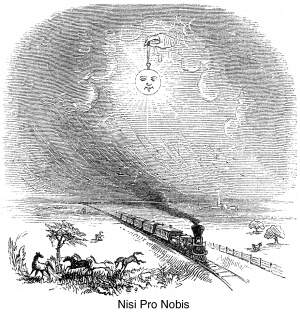 As we approached
Harper's Ferry, suddenly a cry was raised on the foremost platform,
which was repeated from car to car until the whole train resounded
with the exultant shout, "The sun! the sun!" The dun
clouds, broken and flying, hastened from the field like a routed
army, while the conqueror appeared in all his might and majesty.
The heavens shone clear and blue as a baby's eye; the tender leafage
of the mountains looked fresh as budding girlhood; the swelling
bosom of the river flashed with its jeweled foam; the browsing
herds leaped and capered over the meadows in their uncouth gladness;
men rejoiced in the light with a sentiment akin to worship. It
seemed as if all nature was breaking forth into song. "Gaudeamus!" Even the stout engineer, wiping the smoke from his eyes with
his grimy hand, cried out, "Go it, old fel'! 'pears as if
he was hung out a purpose!"
As we approached
Harper's Ferry, suddenly a cry was raised on the foremost platform,
which was repeated from car to car until the whole train resounded
with the exultant shout, "The sun! the sun!" The dun
clouds, broken and flying, hastened from the field like a routed
army, while the conqueror appeared in all his might and majesty.
The heavens shone clear and blue as a baby's eye; the tender leafage
of the mountains looked fresh as budding girlhood; the swelling
bosom of the river flashed with its jeweled foam; the browsing
herds leaped and capered over the meadows in their uncouth gladness;
men rejoiced in the light with a sentiment akin to worship. It
seemed as if all nature was breaking forth into song. "Gaudeamus!" Even the stout engineer, wiping the smoke from his eyes with
his grimy hand, cried out, "Go it, old fel'! 'pears as if
he was hung out a purpose!"
Over that imposing covered bridge, spanning the Potomac River,
we pass from Maryland into Virginia. Through that stupendous gateway,
walled with precipitous rocks, we enter the great valley.
At Harper's Ferry the excursionists were informed that they
would have four hours at their disposal; and thereupon, with commendable
alacrity, they set about the business of sight-seeing, each taking
the road that chance or preference suggested. Some climbed the
steep and winding path that led to Jefferson's Rock—a point
of view made famous by the pen of the sage of Monticello; some
visited the work-shops of the National Armory, where our weapons
of war and glory are manufactured by thousands and hundreds of
thousands; some strolled quietly along the river's brink, preferring
the contemplation of scenes less extended but more picturesque
than those visible from the hill-tops. For our part-having been
familiar with this romantic spot from boyhood—we went to
sleep.
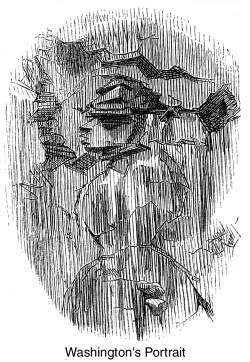 Harper's Ferry
is situated on a point of land at the confluence of the Potomac
and Shenandoah rivers, and opposite the gap in the Blue Ridge
through which the united streams pass onward to the sea. The fact
that it is the seat of a national armory, and has been described
in glowing language by Jefferson, may have given it a wider notoriety
than the comparative merits of its scenery would justify; and
the tourist who only gives it a passing glance may experience
a feeling of disappointment. But if, instead of four hours, he
should be fortunate enough to have four days at his disposal,
or even four weeks, to pass in exploring the town and its environs,
he can be no true lover of the sublime, romantic, and beautiful,
if he fails to acknowledge that his time has been well spent,
and that Harper's Ferry has justified her ancient renown.
Harper's Ferry
is situated on a point of land at the confluence of the Potomac
and Shenandoah rivers, and opposite the gap in the Blue Ridge
through which the united streams pass onward to the sea. The fact
that it is the seat of a national armory, and has been described
in glowing language by Jefferson, may have given it a wider notoriety
than the comparative merits of its scenery would justify; and
the tourist who only gives it a passing glance may experience
a feeling of disappointment. But if, instead of four hours, he
should be fortunate enough to have four days at his disposal,
or even four weeks, to pass in exploring the town and its environs,
he can be no true lover of the sublime, romantic, and beautiful,
if he fails to acknowledge that his time has been well spent,
and that Harper's Ferry has justified her ancient renown.
A capital dinner at Entler's solaced the excursionists after
their scrambling rambles, and at the appointed hour they again
took their seats in the train. As they were about starting their
attention was directed to the figure of a man, half-sculptured
half-painted by the plastic hand of Nature on the face of an impending
cliff. This is supposed by the vulgar to bear a marvelous resemblance
to Washington; and without meaning to pay the picture a pointed
compliment, we must admit that it counterfeits the physical traits
of the first President quite as well as many of his successors
in office have represented his moral virtues.
Continuing our route westward through portions of the fertile
counties of Jefferson and Berkeley, we arrived about five o'clock
in the afternoon at Martinsburg, one hundred miles from our starting-point.
At this station the Railroad Company have extensive work-shops
and stabling for their iron animals, which are duly groomed and
doctored, and make night and day hideous with their noise-reminding
one of Paddy's description of the World's Fair:
"There's staym ingynes,
That stand in lines,
Enormous and amazing;
That squeal and snort,
Like whales in sport,
Or elephants a-grazing."
The clear weather had become a fixed fact, with every promise
of continuance. The world was to be no longer without a sun—the
excursion no longer to miss the smiles of beauty. The Valley of
Virginia owes little of her goodliness and glory to the hand of
man. Her swelling hills are crowned by no stately edifices; no
fair cities lift their embattled towers above her rich-leafed
forests, nor gilded domes reflect the golden radiance of her sunsets;
no ivy-mantled ruin woos the tourist from his path, steeping his
soul in the regal sadness of ancient memories. Yet the valley
boasts of gifts choicer and fairer than these, "of that brave
wealth for heart and eye."
"Fresh from the hand of the All-giver,
Mountain, wood, and sparkling river,
Fatling herds and fruitful field,
All joys that peace and plenty yield,
And more, oh, pleasant land! is thine
Thrice bless'd by bounteous Power Divine.
Earth's sweetest flowers here shed perfume,
And here earth's fairest maidens bloom."
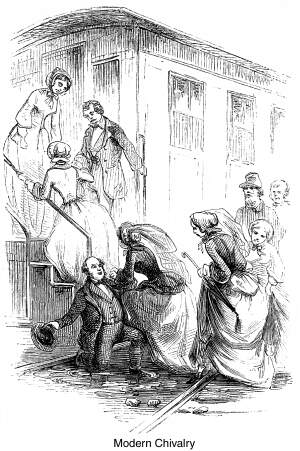 And lest the
passing traveler should unwiltingly look in seem upon the old
town of Martinsburg because, forsooth, the genius of architecture
smiled not on her humble birth, let him know that she may rightfully
claim a share in the foregoing poetic commendations, and that
he fame of her hospitable homes and lovely daughters is wide-spread
and well merited.
And lest the
passing traveler should unwiltingly look in seem upon the old
town of Martinsburg because, forsooth, the genius of architecture
smiled not on her humble birth, let him know that she may rightfully
claim a share in the foregoing poetic commendations, and that
he fame of her hospitable homes and lovely daughters is wide-spread
and well merited.
Now it had been arranged that several ladies should join the
excursion at this place, and when the train stopped in front of
the Depot Hotel quite a bevy appeared on the platform. As they
approached the steps of the parlor car their progress was arrested
by a black puddle left by the recent rains.
"Let me run for a chair," said one gallant escort.
"Get a dry board," suggested another.
Gentle Sirs, you are slow: this is no time nor place for laggard
courtesy. Quick as thought Captain Rawlings stepped forward, and
gracefully dropping on one knee in the water, made a stepping-place
of the other, firm and steady as an arch of limestone. With smiling
acknowledgments the fair Martinsburgers skipped over, and reached
the car with unsoiled slippers.
Poets have sung, artists have painted, historians have recorded
the gallantry of Raleigh, who threw his cloak in the mud to save
the shoes of Queen Bess. Is the flattery accorded to the vanity
of a royal virago a nobler theme than the instinctive homage of
manhood to innocence and beauty? Shall the muses laud the venal
fawning of the courtier, and the unbought chivalry of the man
of the people be forgotten? No! for cheers greeted the gallant
Captain as he rose, and there was, besides, an appreciative eye
that marked the deed—a skillful hand that fixed the scene
and decreed it immortality.
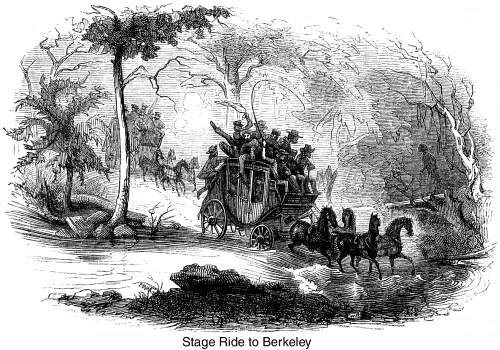 The train arrived
at Sir John's Run about seven o'clock, and the excursionists here
found coaches waiting to convey them to the Berkeley Springs.
As daylight was waning rapidly they lost no time in bestowing
themselves in or about these omnivorous vehicles, calculated for
nine passengers each, but carrying five-and-twenty if necessary.
Forty odd souls and bodies, with their baggage, were packed in
three carriages; and the party, under the guidance of Jimmy Jack,
the most-renowned whip in Virginia, started up the romantic gorge
of Sir John's. As the roads had had the benefit of two months'
steady rain, the travelers had a good opportunity of realizing,
for two miles and a half, what their ancestors would have considered
very comfortable staging. Yet such is the degeneracy of the age
that some grumbled, and swore it was the d----t route they had
ever passed over. It was quite dark when the coaches drove up
in front of the hotel, and discharged their cargoes of excursionists,
filled with enthusiasm, and quite ready for supper. Nor was it
long before a substantial meal had taken the place of the enthusiasm,
and the company assembled in the big dining-room to see what further
entertainment might be drawn from the social talents of the party.
The train arrived
at Sir John's Run about seven o'clock, and the excursionists here
found coaches waiting to convey them to the Berkeley Springs.
As daylight was waning rapidly they lost no time in bestowing
themselves in or about these omnivorous vehicles, calculated for
nine passengers each, but carrying five-and-twenty if necessary.
Forty odd souls and bodies, with their baggage, were packed in
three carriages; and the party, under the guidance of Jimmy Jack,
the most-renowned whip in Virginia, started up the romantic gorge
of Sir John's. As the roads had had the benefit of two months'
steady rain, the travelers had a good opportunity of realizing,
for two miles and a half, what their ancestors would have considered
very comfortable staging. Yet such is the degeneracy of the age
that some grumbled, and swore it was the d----t route they had
ever passed over. It was quite dark when the coaches drove up
in front of the hotel, and discharged their cargoes of excursionists,
filled with enthusiasm, and quite ready for supper. Nor was it
long before a substantial meal had taken the place of the enthusiasm,
and the company assembled in the big dining-room to see what further
entertainment might be drawn from the social talents of the party.
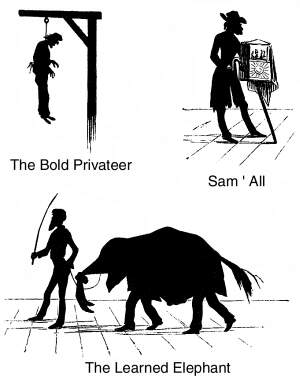 Socrates,
having wearied himself with a long lecture on the difference between
the exoteric and esoteric doctrines of philosophy, and feeling
the need of recreation, joined some boys who were playing at leap-frog
in the academy yard. As they played, numbers of the academicians
passed to and fro; but the presence of these wise and venerable
men did not in the least interfere with the game. Presently there
was seen approaching a highly respectable Athenian"—one
of a class that mistakes pomposity for dignity, gravity for wisdom.
"Boys, we must stop this," said the sage, hastily resuming
his rptg6vtov; "there's a fool coming!" So the
door of the great hall at Berkeley was closed, to shut out the
fools, while the cloak of ceremony was laid aside and the evening
devoted to
Socrates,
having wearied himself with a long lecture on the difference between
the exoteric and esoteric doctrines of philosophy, and feeling
the need of recreation, joined some boys who were playing at leap-frog
in the academy yard. As they played, numbers of the academicians
passed to and fro; but the presence of these wise and venerable
men did not in the least interfere with the game. Presently there
was seen approaching a highly respectable Athenian"—one
of a class that mistakes pomposity for dignity, gravity for wisdom.
"Boys, we must stop this," said the sage, hastily resuming
his rptg6vtov; "there's a fool coming!" So the
door of the great hall at Berkeley was closed, to shut out the
fools, while the cloak of ceremony was laid aside and the evening
devoted to
"Sport that wrinkled Care derides,
And Laughter holding both his sides."
If the wit that sparkles is often too subtle for the power
of pen or pencil, the kindly humor that warms is more picturesque.
This evenings entertainment furnished abundance of both. There
were songs—humorous, sentimental, tragic, characteristic,
and descriptive. The softer sorrows of that mournful ditty, the
"Bold Privateer," were followed by the noisier vexations
of' the man who "bought tripe on Friday." The Wordsworthian
sonnet of "One Fish-ball" was contrasted with the gin-shop
tragedy of "Sam 'All," that made the listeners' hair
stand on end. Then the learned elephant was introduced, who went
through his astonishing performances with a degree of intelligence
almost human. There were mysterious tricks of legerdemain; and,
to conclude, a gentleman drew a carving knife out of his mouth,
supposed to have been accidentally swallowed at supper. The negro
waiters were so awe-struck by this last feat that they were afraid
to touch the knife for some time afterward; and, when the party
left next morning, carefully counted over the spoons, frilly impressed
with the belief that Satan was traveling with the excursionists.
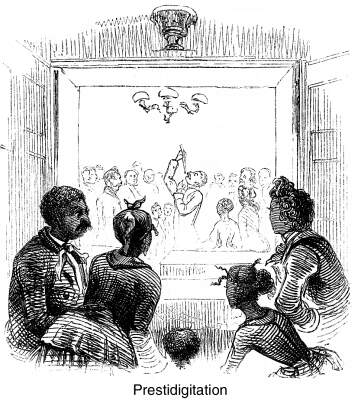 Whether it
was owing to the sedative qualities of the waters of Berkeley
or other causes, the travelers enjoyed a night of profound repose.
Betimes in the morning they were stirring about the village and
public grounds—some sight-seeing, some enjoying a souse in
the glorious pools for which this place is celebrated. Many great
names, now historic, are associated with the fountains of Berkeley,
so that there we trod on classic ground. But these reminiscences
are too numerous and interesting to be treated in an episode.
Of its present attractions we may only say, "The proof of
the pudding is in the eating thereof."
Whether it
was owing to the sedative qualities of the waters of Berkeley
or other causes, the travelers enjoyed a night of profound repose.
Betimes in the morning they were stirring about the village and
public grounds—some sight-seeing, some enjoying a souse in
the glorious pools for which this place is celebrated. Many great
names, now historic, are associated with the fountains of Berkeley,
so that there we trod on classic ground. But these reminiscences
are too numerous and interesting to be treated in an episode.
Of its present attractions we may only say, "The proof of
the pudding is in the eating thereof."
After a hearty, old-fashioned breakfast the excursion exchanged
compliments with its host and parted with three cheers and a tiger.
As the morning was pleasant many preferred to cross the mountain
on foot, and the coaches, with lighter loads, rejoined the train
in good time.
Westward ho! with exhilarating speed, diving deeper and deeper
into the mountains. At one time sweeping and circling with the
graceful sinuosities of the river, at another darting straight
through a projecting spur; now under the cool shadow of a beetling
cliff, then gayly emerging into sunshine and open fields. The
steady fire of appreciative comments showed that the artistic
sense was thoroughly aroused.
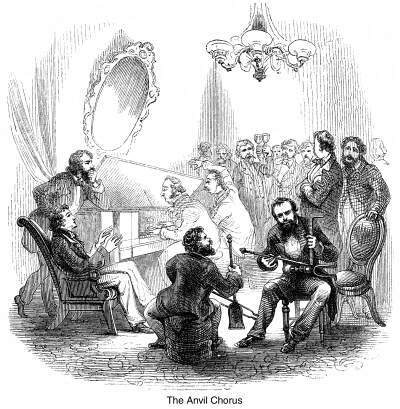 "Exquisite!"
exclaimed one. "This is a perfect Claude!"
"Exquisite!"
exclaimed one. "This is a perfect Claude!"
The ladies looked earnestly at a patch of plowed ground—
"What tinting! Ah, do observe those rocks; how delicately
tender!"
"As a lover's heart," whispered an arch fair one.
"It has precisely the tone of a Ruysdale.
"The tone is any thing but agreeable," said another,
as the steam-whistle closed an agonized yell.
"What noble breadth in the landscape to the right!"
"Yes; it is a mile wide, at least-you mean the meadow?"
"Per Bacco! What an object for a foreground! That
blasted tree reminds me of Salvator."
"It has a frightened look," quoth she. Ill prefer
them with leaves."
"Then what magnificent depth of shadow in the gorge before
us!"
"Pray Heaven we may not tumble in!"
But what do the uninitiated know of the technical ecstasies
of high art; of the contour of Angelo, the feeling of Raphael,
the coloring of Titian, the corregisticy of Corregio? We will
even let them pass.
At New Creek we laid by for the Western passenger train, which,
in passing, left a brilliant addition to the artistic and literary
material of the excursion in the persons of several guests from
Cincinnati. A little after mid-day we arrived at Cumberland; and
after part-taking of an excellent dinner at the "Revere House"
the company separated, to seek in various directions such objects
of curiosity and amusement as the town and its vicinity afforded.
The town of Cumberland is situated in a romantic basin, surrounded
by lofty and picturesque mountains. It has been more fortunate
than most of our American towns in its architectural embellishments,
which seem to have been designed for their places, and, instead
of marring, add to the effect of the surrounding scenery. Considering
its position and circumstances, the Gothic chapel is one of the
prettiest bits of architecture in the country.
A gorgeous sunset closed the second day, and gave promise of
a bright to-morrow. Those who had been wandering in the hills,
or had made episodical excursions to Frostburg and Mount Savage,
returned well pleased with what they had seen, and the 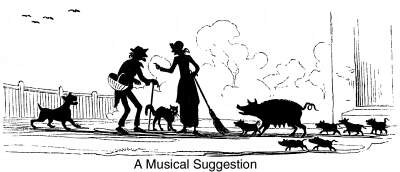 company reassembled in force in the parlors
of the hotel. Here some of the amusements of Berkeley were repeated;
and with the, assistance of a fine piano and some other instruments
happily improvised for the occasion, the anvil chorus from "
Il Trovatore" was performed with stunning effect.
company reassembled in force in the parlors
of the hotel. Here some of the amusements of Berkeley were repeated;
and with the, assistance of a fine piano and some other instruments
happily improvised for the occasion, the anvil chorus from "
Il Trovatore" was performed with stunning effect.
On the morning of the third day it rained, and damp masses
of cloud hung about the sides and obscured the summits of the
mountains. The artists, however, found more to admire than regret
in this circumstance. What could be more appropriately brought
together than clouds and mountains? Each lent and borrowed grandeur
from the other.
The company breakfasted on board the train at full speed. During
the meal a furious thunderstorm burst over the moving hostelrie.
It was magnificent, and we laid down our knife and fork to quote
Byron:
"The sky is changed, and such a change! O night,
And storm, and darkness, ye are wondrous strong!
Yet beautiful in your strength as is the light
Of a dark eye in woman—"
"Please pass beef-steak for the lady."
"Certainly."
"Far along,
From peak to peak, the rattling crags among,
Leaps the live thunder—not from one lone cloud,
Put every mountain now hath found a tongue;
And Jura answers from her misty shroud
Back to the joyous Alps that call to her aloud."
"Will you have a deviled crab?"
"Thank you, yes, Byron and deviled crabs go very well
together."
"Oh! I have loved—"
"What-crabs?"
"No, my, friend—the ocean."
"Why, in the name of sense, don't you eat your breakfast?".
"Ah, what a pity they should have happened together! A
thunder-storm, which I adore; and breakfast, which is essential.
I can get no good of either.
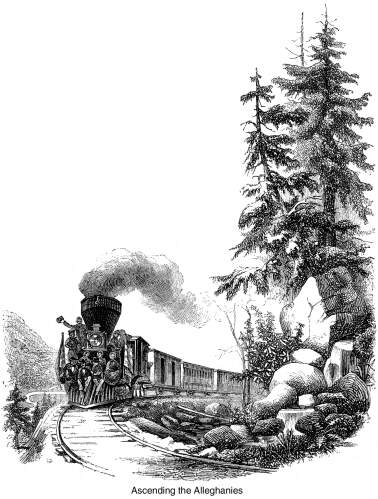 At Piedmont,
208 miles from Baltimore located the central machine shops of
the road; around which has grown up a town of twelve hundred inhabitants.
As its name indicates, it lies at the foot of the main chain of
the Alleghanies—the great back-bone dividing the waters of
the East from the West.
At Piedmont,
208 miles from Baltimore located the central machine shops of
the road; around which has grown up a town of twelve hundred inhabitants.
As its name indicates, it lies at the foot of the main chain of
the Alleghanies—the great back-bone dividing the waters of
the East from the West.
Up to this point the course of the Baltimore and Ohio Road
has led us through a country rugged and difficult indeed, but
sufficiently practicable upon the ordinary principles of railroad
engineering received and in use elsewhere. We have remarked the
elegant design and durable materials of its numerous tunnels,
crossways, and bridges, and the general substantial and permanent
character of its construction; but as yet it has exhibited none
of the peculiar features entitling it to that marked pre-eminence
which is claimed for it over all similar works in the world. It
is in the passage from Piedmont to Grafton that these bold and
original characteristics are fully developed. On this division
grades have been adopted averaging 116 feet to the mile—at
one place for eleven consecutive miles, eight miles at another,
and on either side of the Kingwood Tunnel, for some distance,
are grades 106 feet to the mile.
This system, when first proposed by the Chief Engineer, B.
H. Latrobe, was so far in advance of any thing which had been
yet attempted, and so contrary to received theories, that the
Company became alarmed, and a popular outcry was raised against
it. Fortunately for the enterprise, and for science itself, the
genius which conceived the idea was united with the courage to
sustain it. The result has been a splendid success. Thus, by one
bold leap, the Alleghanies were scaled, and the Mountains of Difficulty
which existed in the imaginations of the scientific world were
dissipated.
As the train commenced ascending the mountain a number of the
excursionists, including the ladies, took their seats on the front
of the engine and cow-catcher, for the purpose of obtaining a
better view of the grand scenes which were opening before and
around them. Such was the confidence felt in the steadiness and
docility of the mighty steed that the gentlemen considered it
a privilege to got a place; while their gentler companions reclined
upon his iron shoulders and patted his brazen ribs as though he
were a pet pony.
In the tales of chivalry, when a knight has rescued a beauteous
damsel from some impending danger, or is engaged in the equally
praise worthy business of stealing her away from her father, his
war-horse is represented as being highly flattered with the honor
of bearing the precious burden, and as manifesting his sense of
it with arching neck and kindling eye, etc. As might and magnanimity
are supposed to be inseparable, we may doubtless imagine that
"232" appreciated his position; that he humped himself
with pride, moderated his whistle, and "roared as gently
as a sucking dove;" tripped it mincingly up the savage steep-smoothly
as though his joints were greased with perfumed oil. Doubtless
he did all these things and more; but we were occupied with the
grandeur of the mountains; the awful gorge, deepening as we progressed,
through which the savage river toiled and raged; the mossy rocks
and groups of lofty firs near at hand, that gave the scene a Norwegian
aspect; the silvery streamlets flashing through sombre thickets
of evergreen; the gorgeous bouquets of azalia and mountain honey-suckle,
that recalled the luxuriance of the tropics.
At Altamont we had attained the summit of the Alleghany, and
the highest point on the route, 2638 feet above the ocean-tides.
It is a well-established fact that as persons ascend to considerable
heights there is a corresponding elevation of the spirits, an
expansion of the faculties—whether referable to the condition
of the atmosphere or innate causes we can not decide, but will
relate a remarkable incident bearing on the subject.
A gentleman, happening to overhear one of the ladies express
her admiration of the flowers that bloomed in wild profusion on
the summit plains, gallantly descended into the thickets, and
gathering a bouquet of the most perfect specimens, carefully inclosed
it in a chalice of graceful ferns. Returning to the car, he presented
it with the following address:
"Madam, the greatest English poet sings how
"'Proserpina gathering flowers,
Herself, a fairer flower, by gloomy Dio was gathered.'
On which occasion, Madam, the lovely daughter of Ceres was
like the flowers I have the honor of presenting to you—a
bouquet in-fern-al."
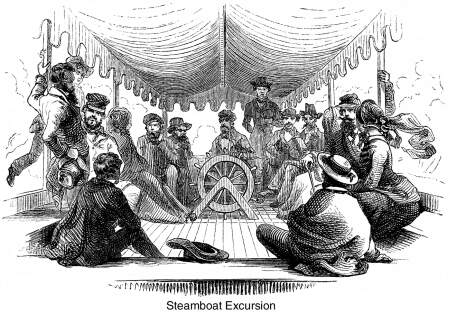 Whether this
is to be classed among the meteorological or psychological phenomena
is an undetermined question; but immediately thereafter the train
began to descend by a gentle slope into the region of the glades—those
breezy highland meadows lying between Altamont and Cranberry Summit.
Whether this
is to be classed among the meteorological or psychological phenomena
is an undetermined question; but immediately thereafter the train
began to descend by a gentle slope into the region of the glades—those
breezy highland meadows lying between Altamont and Cranberry Summit.
A short call at the "Oakland Mountain House," then
a rapid run over Cranberry Summit, and down the mountain for twelve
miles, by grades similar to those by which we ascended, brought
us to the famous Cheat River, whose amber waters roll through
mountain gorges two thousand feet in depth. We have tried our
pen on less imposing scenes, but here we are dumb. Possibly we
started on too high a key in the outset, like the enthusiastic
Frenchman with his "grande! superbe! magnifique!" and, having exhausted our superlatives, have no resource but to
shrug our shoulders and say, Ah, very pretty!"
The Cheat River region is the great scenic lion of the road,
as the Tray Run Viaduct is the mechanical wonder. At this last-mentioned
point the train laid by for several hours to give the artists,
poets, and photographers an opportunity to exercise their faculties.
The road here is located along the steep mountain-side, about
three hundred feet above the bed of the river. Over a ravine making
down at right angles with the main gorge the viaduct in question
is constructed, carrying the track 225 feet above its base. The
structure is as admirable for its light and graceful form as for
its evident strength and the imperishable durability of its material.
From the high embankment that overlooks the river one may see
the line of the road for some distance up and down; and nowhere
else, perhaps, does the result of human labor lose so little in
the immediate comparison with the grander works of nature. One
wonders alternately at the vastness of the obstacles and the completeness
of the achievement in surmounting them.
Resuming our westward course, with a number of ups and downs,
over rivers and under mountains, passing the Kingwood Tunnel,
four thousand one hundred feet in length, we arrived at Grafton
a little before sunset. Immediately on landing, a small party
of the excursionists, a dozen or fifteen in number, composed of
the ladies and their immediate attendants, embarked on a miniature
steamer for an episodical pleasure trip on the Tygart's Valley
River. The boat, which was about thirty feet long, and had a boiler
like the hotel teakettle, puffed along in a way that reminded
one of the early efforts of a young whale. But as speed was no
object, the little animal's fussy endeavors only served to entertain
the company. There was something dramatic in the contrast between
these scenes and those they had just left. From the rushing and
roaring of the cars through lonely and. savage mountains they
suddenly find themselves gliding with swan-like motion on a river
calm and beautiful as an Italian lake. Reclined beneath the picturesque
awning that covered the after-part of their little vessel, they
luxuriated in the evening coolness of the summer air, and looked
with delight upon the placid bosom of the stream, that mirrored
the rich overhanging foliage of the beech and maple, and mimicked
with exquisite art the hues of sunset, as they changed from purple
and flaming gold tothe soft violet of twilight. At intervals several
well-trained voices discoursed harmonious music in accordance
with the spirit of the scene, that nothing might be wanting to
complete the enchantment of the fairy voyage.
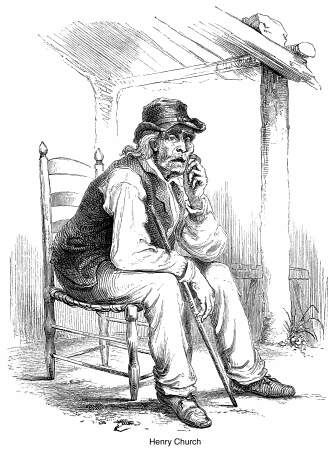 Three consecutive
days of activity and excitement had fatigued even the elephant;
and after a short but brilliant musical entertainment in their
own parlor, the excursionists went to bed.
Three consecutive
days of activity and excitement had fatigued even the elephant;
and after a short but brilliant musical entertainment in their
own parlor, the excursionists went to bed.
Renovated by a night of sound sleep, invigorated by the mountain
air and a strong breakfast, the excursion went forth to greet
the morning sun with unabated ardor.
The Alleghanies were behind them—westward ho! Seven miles
from Grafton they tarried to enjoy one of the most exquisite bits
of scenery which had yet met their eyes: the Valley Falls, where
the river takes two leaps, in quick succession, of ten or twelve
feet each, and then descends in long rocky rapid some seventy
feet in a mile.
As we leave the mountains the traits of ruggedness and sublimity
disappear, and the country assumes those softer characteristics
which obtained for the Ohio the name of "La belle Riviere."
A short distance beyond Burton the train was stopped to give
the excursionists an opportunity of visiting a couple who, from
their extreme old age, have considerable local notoriety. Their
cottage stood immediately by the way-side; and the old folks,
with several of the younger fry, were at home, rather astonished,
no doubt, at the number and character of their visitors.
Henry Church was born in Suffolk, England, in the year of our
Lord 1750, and is now a hundred and eight years old. He came to
this country a British soldier, of the 63d Light Infantry, and
served under Lord Cornwallis in the memorable campaign of 1781.
But it was not his fortune to have seen that great day of glory
and disaster at Yorktown which terminated that campaign, and with
it the War of Independence. A short time previous, while on a
scouting-party between Richmond and Petersburg, he was taken by
the troops under Lafayette, and sent a prisoner to Lancaster,
Pennsylvania. He remained here until peace was proclaimed; but
the general amnesty brought no freedom for the captive Briton.
He had become entangled in a flaxen net stronger than the bonds
of way, and the meek eyes of a Quaker maiden had more enduring
power than the bayonets of the 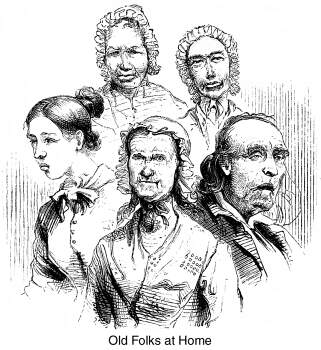 patriot regiments. Forgetting his loyalty to King and
country, the ex-soldier embraced the sweet incarnation of peace,
and bowed his martial neck to the gentle yoke, which he has worn
with exemplary patience and constancy for seventy-and-seven years.
Hannah Keine, the amiable Friend whose charms have so long led
captivity captive, was born in Chester County, Pennsylvania, in
1755, and is at this day one hundred and three years of age. She
is erect, active in her movements, in full possession of all her
faculties, and is still the tidy, thrifty, bustling mistress of
the household she has ruled for more than three-quarters of a
century. Eight children are the fruits of this union, the eldest
of whom is in his seventy-sixth year; the youngest is fifty-four.
Six of these have married, and the aggregate result is sixty-two
grandchildren. One died, we are told, when between fifty and sixty
years old, and the sorrowing mother was heard to say, in a tone
of resignation,
patriot regiments. Forgetting his loyalty to King and
country, the ex-soldier embraced the sweet incarnation of peace,
and bowed his martial neck to the gentle yoke, which he has worn
with exemplary patience and constancy for seventy-and-seven years.
Hannah Keine, the amiable Friend whose charms have so long led
captivity captive, was born in Chester County, Pennsylvania, in
1755, and is at this day one hundred and three years of age. She
is erect, active in her movements, in full possession of all her
faculties, and is still the tidy, thrifty, bustling mistress of
the household she has ruled for more than three-quarters of a
century. Eight children are the fruits of this union, the eldest
of whom is in his seventy-sixth year; the youngest is fifty-four.
Six of these have married, and the aggregate result is sixty-two
grandchildren. One died, we are told, when between fifty and sixty
years old, and the sorrowing mother was heard to say, in a tone
of resignation,
"Well, it was always a weakly child, and I never expected
to raise it."
Their daughter, Hannah, still lives a maiden, and true to her
filial duties. She is now "hard on" to sixty; and as
we saw her tripping, barefoot, from the corn patch (where she
had been hoeing), we were not impressed with the idea that Time
had been anywise lenient in his dealings with her. In view of
these things, some good-natured neighbor lately ventured to suggest
that it was high time she was looking out for a settlement, and
following the example of her brothers and sisters.
"Ah!" said the old man, I hope she'll have the grace
to wait till I am gone. It can't be many years now. But,"
he continued, with a sigh, "who knows? These young gals are
uncertain!"
Then we were reminded of the ancient arrow-maker and his touching
grief—
"Thus it is our children leave us!"
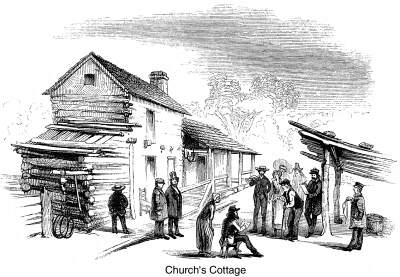 The company
has paid its respects to the incarnate centuries, and the artists,
with rapid pencils, are making notes of the scene. In the centre
is the old man, bowed upon his staff, and holding to his wife's
arm, as she stands stark and stiff, like an umbrella stuck into
a blue cotton case—for superfluity of skirts and crinoline
were not of her day and generation. His iron frame is evidently
yielding to the weight of years. Deaf, dim-eyed, his heavy jaw
relaxed, his face wears ordinarily a look of vacuity; but bring
him a goblet crowned with generous wine, or, what is more potent,
though less poetical, a tin of old whisky—the milk of age—his
hearing and eyesight will quickly improve, and he will discourse
freely and intelligently of his past life; speaking of men and
things belonging to our early history as the occurrences and acquaintances
of yesterday.
The company
has paid its respects to the incarnate centuries, and the artists,
with rapid pencils, are making notes of the scene. In the centre
is the old man, bowed upon his staff, and holding to his wife's
arm, as she stands stark and stiff, like an umbrella stuck into
a blue cotton case—for superfluity of skirts and crinoline
were not of her day and generation. His iron frame is evidently
yielding to the weight of years. Deaf, dim-eyed, his heavy jaw
relaxed, his face wears ordinarily a look of vacuity; but bring
him a goblet crowned with generous wine, or, what is more potent,
though less poetical, a tin of old whisky—the milk of age—his
hearing and eyesight will quickly improve, and he will discourse
freely and intelligently of his past life; speaking of men and
things belonging to our early history as the occurrences and acquaintances
of yesterday.
Among the excursionists was an attaché, of the British
Legation at Washington—a young soldier decorated for gallant
conduct on the bloody parapets of the Redan.
"Father Church, let us introduce a countryman—an
Englishman, and a soldier like yourself."
The old man took the extended hand mechanically, but his dull
eyes gave us no sign.
"Bring here the bugle."
The instrument was brought, and the young officer sounded one
of the martial airs of England. Old Hundred stood up as if his
blood had been warmed with wine, and his face flashed with intelligence.
"I know it—I know it—An Englishman and a soldier
did you say? Ay, and a brave lad, I'll warrant."
It was a touching and thought-compelling scene to see these
two together. The old man, eighty years ago, had landed on our
shores an armed invader to aid in crushing out the spirit of revolt
in the feeble and disorganized colonies that bordered the Atlantic
coast. With the sound of that martial bugle call he doubtless
hears the roll of musketry and the deep growl of cannon. Unconscious
of the misty present, he sees with the eyes of youth the scarlet
battalions of his King marching and maneuvering in vain to force
the wary and vigilant host of the rebels to untimely battle. Cornwallis,
Tarleton, Lafayette, Lee—these are the names that fill his
thoughts. With all these memories fresh in his brain he stands
face to face, grasping the hand of the youth, who, member of a
lordly embassy, has come to bear friendly greeting from Old England
to the Great Nation of the western continent—a nation whose
bounds extend from ocean to ocean; whose ships are in every sea;
whose civilization, illuminating the breadth of the New World,
reflects back upon the Old, light for light.
Before the last royal soldier that treads our soil shall have
passed away may the memory of oppression, war, and hatred sink
into the grave of oblivion; while hopeful, strong, and true as
youth, may friendship spring between nations of kindred blood,
laws, language, and religion!
Although the culminating point of scenic interest was past,
the social life of the excursion had on the fourth day reached
its most attractive stage. No friendship can be considered as
firmly cemented until the parties have mutually confided to each
other their little weaknesses and peccadilloes-their loves and
debts, hopes and disappointments. No social community can be regarded
as thoroughly mixed and mellowed until the members permit themselves
unreservedly to make puns. It is a symptom that folks have agreed
to lay aside the panoply of ceremony, generally irksome to all
except those who have nothing else to wear. Dr. Johnson, the Ursa
Major of English letters, said that a punster would steal. Dictionaries
define punning as "a low species of wit." Heaven preserve
our social life from lump-headed learning! We think a discreet
punster a treasure in any company; a timely pun; very good wit;
a bad one, very good humor—the worse the better.
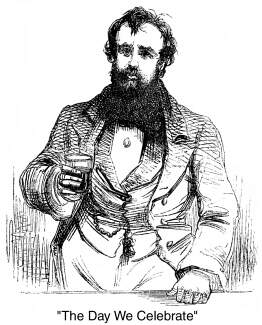 At the Broad
Tree Tunnel, instead of diving through the mountain, the excursion
passed over it by the zigzag road which bad been used before the
completion of the more direct subterraneous passage. To perform
this two additional engines were brought into service. The train
divided into three parts, and each engine taking charge of its
portion, began the ascent of the hill by a grade of 250 feet to
the mile.
At the Broad
Tree Tunnel, instead of diving through the mountain, the excursion
passed over it by the zigzag road which bad been used before the
completion of the more direct subterraneous passage. To perform
this two additional engines were brought into service. The train
divided into three parts, and each engine taking charge of its
portion, began the ascent of the hill by a grade of 250 feet to
the mile.
The novelty of the passage so exhilarated the wits of the company
that the puns rained, in numbers and brilliancy reminding one
of the meteoric shower of 1836, which so astonished the negroes
in Virginia and the savants all over the world. They crackled
like a bunch of Chinese firecrackers let off in an empty barrel.
Who lit the match? We don't know. Doubtless one of the literary
men who remembered a couplet in "The Child's Own Book."
"YY. U. R. YY. U. B,
I. C. U. IL YY. for me."
The track over the hill is laid in the form of YYY connected in a regular zigzag. Upon that hint every body spoke
at once. The consequences were charming, delightful, sublime;
ay, and a step beyond. We can not recall half the good things
that were said; we would not repeat them if we could. The confidence
of these jolly and unguarded moments should be inviolate. Besides,
many a savory dish is relished warm, which, if served cold, might
be thought little better than an emetic.
At length the train reached the banks of the Ohio, and the
eyes of many of the excursionists rested for the first time on
the beautiful River of the West. From thence to Wheeling the road
follows the course of the stream at Moundsville, passing in sight
of the Indian tumulus, seventy feet in height. Although this is
one of the points of especial interest the excursion did not stop
to examine it, but hurried on to the termination of their trip.
As they entered the town of Wheeling the President of the Committee
on toasts arose, and, with a sparkling bumper in one hand, proposed
the three hundred and seventy-ninth regular toast (being one for
every mile of the road), with the understanding that it was positively
to be the last. The sentiment was received with immense applause—which
applause was reinforced by a thundering salute of cannon from
without. The excursion was handsomely received by the Railroad
Company's officials, and conveyed from the depot to the "M'Clure
House" in several omnibuses furnished for the occasion.
Here they reposed for a time, for the mid-day heat was oppressive,
and it was not until toward the middle of the afternoon that they
again ventured out in detached parties—in carriages or afoot—to
see the Lions. Wheeling is famous for its thriving manufactories
of glass and iron, and is equally renowned for the free and genial
hospitality of its citizens. The town is like many a child we've
seen, that would be very pretty if its face was washed. But in
recompense its environs are beautiful. The bold bluffs of the
Ohio, softened with the tender leafage of June, fully justify
the fame of the lovely river, while a drive across the noble suspension
bridge to Zanes Island and the agricultural fair grounds well
repays the trouble. Behind the town is Wheeling Hill, from whose
summit the view is extensive, grand, and unique.
As we returned to the "M'Clure House" about dark
we met a friend who saluted us with a joyful countenance.
"Comrade," said he, "I have discovered a new
pleasure—come share it with me."
"What's that?"
"A Catawba cobbler."
"Bravissimo! lead the way."
So the cobblers were manufactured, and a plump strawberry dropped
into each glass among the tinkling ice.
"I've had eight already," quoth my friend, each better
than the other."
"Oh, Hebe! what a drink! This is the wine that Longfellow
has poetized:
"Very good in its way
Is the Verzenay,
Or the Sillery soft and creamy;
But Catawba wine
Has a taste more divine,
More dulcet, delicious, and dreamy.
"There grows no vine
By the haunted Rhine,
By Danube, or Guadalquiver,
Nor on Island or Cape
That bears such a grape
As grows by the beautiful river."
"Eight are enough," observed my friend, with a touch
of sadness in his voice. "At nine they begin to deteriorate.
Nine, this time, was a trifle too acid."
In due time an elegant supper was served which was disposed
of in a most satisfactory manner, highly creditable to all parties.
Then followed a hospitable welcome from the venerable Mayor of
Wheeling, with toasts, speeches, and compliments right and left.
Every body was pleased, charmed, delighted with every body else,
with every thing, with themselves, the road, and the excursion
generally. Hip—hip—hip—hurrah!
At eleven o'clock the company re-embarked, and started on their
return eastward. If during the four days of leisurely movement
we had been delighted with the examination of the details of the
road, and impressed by the sublimity of its natural surroundings,
yet the wonderful character of the achievement was more fully
realized by the rapid, unbroken sweep over the whole length of
the rail from Wheeling to Baltimore, 379 miles in 16 hours, without
an incident, a jolt, or the slightest discomfort.
On the 5th of June the company arrived at the Camden Street
Station, about three o'clock in the afternoon. The excursion was
over; but we will venture to say that, like
"The feast of O'Rourke, it will ne'er be forgot
By those who were there, or those who were not."
B & O RR | Antebellum RR | Contents
Page







